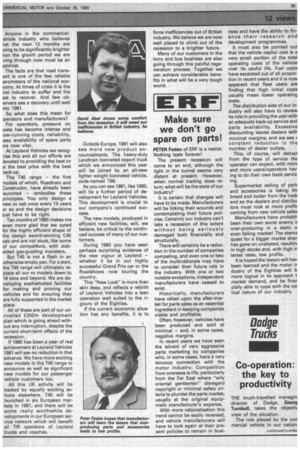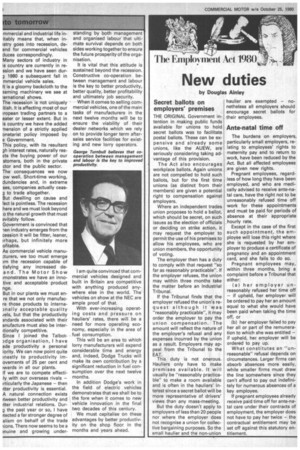Make sure we don't go spare on parts!
Page 97

Page 98

If you've noticed an error in this article please click here to report it so we can fix it.
PETER Foden of ERF is a realist. Nothing lasts forever!
The present recession will come to an end, although the light in the tunnel seems very distant at present. However, when normal trading does return, what will be the state of our industry?
It is certain that changes will have to be made. Manufacturers will be licking their wounds and contemplating their future policies. Certainly our industry can't take a recession of this extent without being seriously damaged both financially and structurally.
There will certainly be a reduction in the number of companies competing, and even one or two of the multinationals may have to consider their future role in the industry. With one or two notable exceptions, independent manufacturers have ceased to exist.
Historically, manufacturers have relied upon the after-market for parts sales as an essential ingredient in keeping companies viable and profitable.
Often, however, vehicles have been produced and sold at minimal — and, in some cases, negative margins.
In recent years we have seen the advent of very aggressive parts marketing by companies who, in some cases, have a very tenuous connection with the motor industry. Competition from overseas is rife, particularly from the Far East where "wily oriental gentlemen" disregard copyright or minimal safety criteria to plunder the parts market, usually at the original equipmeht manufacturer's expense.
With more rationalisation this trend cannot be easily reversed, and vehicle manufacturers will have to look again at their present policies to remain in busi
ness and have the ability to finance their research and development programmes.
It must also be pointed out that the vehicle capital cost is a very small portion of the total operating costs of the vehicle over its usuful life. Fuel costs have escalated out of all propor tion in recent years and it is now apparent that fleet users are finding that high initial costs usually mean lower operating costs.
The distribution side of our industry will also have to review its role in providing the user with an adequate back-up service and parts availability. Excessive
discounting leaves dealers with minimal margins, and we see E constant reduction in the number of dealer outlets.
This, of course, will detraci from the type of service the operator can expect, with morE and more users/operators hay ing to do their own basic servic ing.
Supermarket selling of pare and accessories is taking thE bread and butter from the track and so the dealers and distribu tors must look at more profit: coming from new vehicle sales Manufacturers have probabl■ been their own worst enemy ir over-producing in a static o even falling market! The eterna quest for a bigger market shan has gone on unabated, resultini in high stocks and, with high in terest rates, low profits.
It is hoped the lesson will hay been learned and the motor ir dustry of the Eighties will b more logical in its approach t market demand, and be finar cially able to cope with the cy( lical nature of our industry.
mmercial and industrial life initably means that, when inistry goes into recession, deand for commercial vehicles duces correspondingly.
Many sectors of industry in is country are currently in ression and we have seen durg 1980 a subsequent fall in mmercial vehicle sales.
It is a gloomy backcloth to the 3aming machinery we see at ternational shows.
The recession is not uniquely itish. It is affecting most of our iropean trading partners to a eater or lesser extent. But in is country we have the added -nension of a strictly applied onetarist policy imposed by e Government.
This policy, with its resultant gh interest rates, naturally rescts the buying power of our stomers, both in the private ctor and the public sector. The consequences we now ow well. Short-time working, dundancies and, in extreme ses, companies actually ceas I to trade altogether.
But dwelling on cause and fect is pointless. The recession here and we must look beyond :o the natural growth that must avitably follow.
Government is convinced that len industry emerges from the cession it will be fitter, leaner, )rhaps, but infinitely more ofitable.
As commercial vehicle manuturers, we too must emerge am the recession capable of tisfying any increased deand. The Motor Show :monstrates we have an innotive and acceptable product nge.
But in our plants we must enre that we not only manufacre those products to interneDI-rally acceptable quality /els, but that the productivity )ndards associated with their anufacture must also be interItionally competitive.
Since I joined the TalbotAge organisation, I have ade productivity a personal iority. We can now point quite )nestly to productivity imovements of 25 per cent and wards in all our plants.
If we are to compete effectily with our overseas rivals — irticularly the Japanese — then !tter productivity is essential. A natural connection exists aween better productivity and :tter industrial relations. Durg the past year or so, I have :tected a far stronger degree of alisrn on behalf of the trade lions. There now seems to be a muine and growing under standing by both management and organised labour that ultimate survival depends on both sides working together to ensure the future prosperity:of the organisation.
It is vital that this attitude is sustained beyond the recession. Constructive co-operation between management and labour is the key to better productivity, better quality, better profitability and ultimately job security.
When it comes to selling commercial vehicles, one of the main tasks of manufacturers in the next twelve months will be to ensure the viability of their dealer networks which we rely on to provide longer term aftersales service facilities for existing and new lorry operators.
I am quite convinced that commercial vehicles designed and built in Britain are competitive with anything produced anywhere else in the world. The vehicles on show at the NEC are ample proof of that.
With ever-increasing operating costs and pressure on hauliers' rates, there will be a need for more operating economy, especially in the area of fuel consumption.
This will be an area to which lorry manufacturers will expend considerable time and energy and, indeed, Dodge Trucks will make its own contribution by a significant reduction in fuel consumption over the next twelve months.
In addition Dodge's work in the field of electric vehicles demonstrates that we shall be to the fore when it comes to new vehicle innovation in the final two decades of this century.
1. We must capitalise on these advantages by better productivity on the shop floor in the months and years ahead.
























































































































































